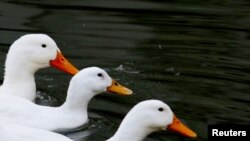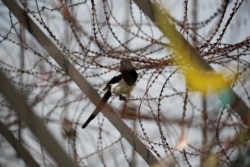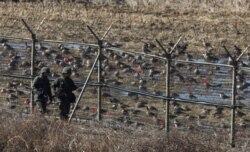Dialogue between South and North Korea is at a standstill and the COVID-19 pandemic has halted nearly all cross-border cooperation. But some conservationists say migratory birds could lead the two Koreas toward re-engagement.
As winter descends over northeast Asia, millions of birds embark on a southbound, intercontinental journey along the East Asian-Australasian Flyway, a route that comprises 22 countries, spanning from the Arctic north to temperate waters of the south Pacific and Indian oceans.
Along the way, most of these roughly 50 million birds pass through the Yellow Sea, which is bordered on land by China and the Korean Peninsula. Some of these 200 or more species briefly stay in the area’s wetlands and mudflats, while various types of shorebirds, including ducks, geese and cranes, reside here throughout the season.
Doug Watkins, chief executive for the East Asian-Australasian Flyway Partnership Secretariat in Incheon, said these birds are “links between countries” in the region.
A shared interest
“There are enormous challenges” in maintaining relations between the two Koreas, he said. “But one of the things they share are migratory birds.”
One South Korean politician also sees potential to revive stalled inter-Korean cooperation via the flyway.
“Most exchange programs between the Koreas are either economic or cultural,” said Heo Seok, the mayor of Suncheon, home to a migratory waterbird reserve. “Since official relations are strained now, there could be opportunities for more private sector exchanges concerning ecology.”
Heo suggests one way to restart collaboration is to share wetland management skills that could be conducted via sister-city programs between Suncheon and municipalities in North Korea. He also hopes to involve Pyongyang in a regional project that tracks the migration path of hooded cranes.
Collaboration to protect shared wildlife is a common cause that could help restart dialogue between the two Koreas, some observers said.
But it is unclear if such initiatives could rebuild the progress that was lost earlier this year.
Communication stopped
Communication between the two Koreas was severed in June after North Korea cut off military hotlines and its forces demolished a joint liaison office on its side of the border.
Pyongyang has rejected aid from South Korea during the coronavirus pandemic and has also ignored an offer by Seoul to launch an investigation into the shooting death of a South Korean maritime official at the hands of North Korean soldiers in September.
Despite these setbacks, Christopher McCarthy, who studied biodiversity in North Korea as a 2020 research fellow at the Institute for Far Eastern Studies in Seoul, said there was still room to engage the North through less politicized overtures.
“Nothing is very apolitical in North Korea, but environmental conservation is probably as close to apolitical as you can get,” McCarthy said.
He said North Korea had already signed multiple international accords, such as the Paris Agreement on mitigating climate change and the U.N. Sustainable Development Goals, and in 2018 it ratified the Ramsar Convention, a treaty to protect wetlands. Pyongyang has also joined the EAAFP and has designated two flyway network sites — the Mundok and Kumya wetland reserves.
“This reveals that North Korea knows it needs to protect its environment, and the international community is probably the best partnership it can have to step up their efforts,” McCarthy said.
However, South Korea’s Unification Ministry told VOA that it currently has no position on engaging the North through wildlife or environmental protection programs.
Bernhard Seliger, Korea representative of the German Hanns Seidel Foundation in Seoul, said joint initiatives to protect common bird populations were unlikely to help re-establish inter-Korean talks.
“There will be no inter-Korean dialogue on this topic for the time being,” Seliger wrote in an email, adding that multinational negotiations were for now the more likely way to help the Koreas rebuild trust and foster bilateral relations.
After the pandemic
But any efforts from Seoul or the international community to directly cooperate with North Korea will most likely need to wait until the end of the COVID-19 pandemic, Seliger said.
Since January, Pyongyang has had its borders closed.
For the EAAFP’s Watkins, travel restrictions throughout the entire flyway have set back projects to monitor some endangered bird species.
“We are losing a whole year of information,” he said.
But while Watkins is easily able to virtually collaborate with colleagues in other locations, that is not the case with his partners in North Korea, where internet and email access is highly restricted or unstable.
“Once the country is open again to travelers, I am sure we will pick back up where we left off before COVID started,” he said.






